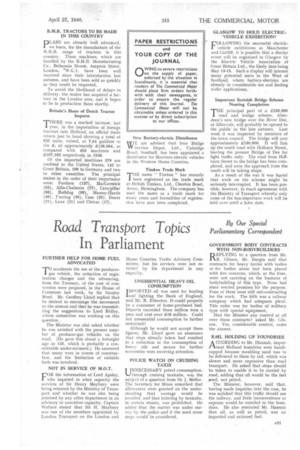Road Transport Topics
Page 33

If you've noticed an error in this article please click here to report it so we can fix it.
In Parliament
FURTHER HELP FOR HOME FUEL ADVOCATED
TO accelerate the use of the producergas vehicle, the reduction of registration charges and the advancing, from the Treasury, of the cost of conversion were proposed, in the House of Commons last week, by Sir Stanley Reed. Mr. Geoffrey Lloyd replied that he desired to encourage the movement to the utmost and that he was transmitting the suggestions to Lord Ridley, whose committee was working on this question .
The Minister was also asked whether he was satisfied with the present number of producer-gas vehicles on the road. (He gave this about a fortnight ago as 125, which is probably a considerable under-estimate.) He answered that many were in course of construction, and the limitation of suitable fuels was involved.
NOT IN SERVICE OF M.O.T.
FOR the information of Lord Apsley, who inquired in what capacity the services of Sir Henry Maybury were being retained by the Ministry of Transport and whether he was also being retained by any other department in an advisory or executive capacity, Captain Wallace stated that Sir H. Maybury was one of the members appointed by London Transport on the London and
Home Counties Traffic Advisory Committee, but his services were not retained by his department in any capacity.
UNESSENTIAL HEAVY-OIL CONSUMPTION
I MPORTED oil was used for heating and lighting the Bank of England, said Mr, R. Etherton. It could properly be a consumer of home-produced fuel. Imports exceeded three million tons a year and cost over E18 million. Could not unessential consumption be further restricted?
Although he would not accept these figures, Mr. Lloyd gave an assurance that steps already taken had resulted in a reduction in the consumption of heavy oils and means for further economies were receiving attention.
POLICE WATCH ON CRUISING TAXIS
UNNECESSARY petrol consumption, through cruising taxicabs, was the subject of a question from Sir J. Mellor. The Secretary for Mines remarked that allowances were granted on the understanding that wastage would be avoided, and that loitering by taxicabs, in certain streets, was prohibited. He added that the matter was under survey by the police and if the need arose steps would be considered. By Our Special Parliamentary Correspondent
GOVERNMENT BODY CONTRACTS WITH NON-BODYBUILDERS • EPLYING to a question from Mr.
R. Gibson, Mr. Burgin said that contracts for heavy lorries with bodies or for bodies alone had been placed with five concerns, which, at the time, were not carrying on the business of bodybuilding of this type. None had since erected premises for the purpose. Four of them were still sub-contracting for the work. The fifth was a railway company which had adequate plant. This order was for bodies of military type with special equipment.
Had the Minister any control at all over these contracts? asked Mr. Gibson. Yes, considerable control, came the answer.
RAIL HOLDING UP -FOUNDRIES ACCORDING to Mr. Hannah, important Midland foundries were handicapped because moulding sand was to be delivered to them by rail, which was slower and more expensive than road transport. He asked that steps should be taken to enable it to be carried by road, adding that oil would be the fuel used, not petrol.
The Minister, however, said that, having made inquiries into the case, he was satisfied that this traffic should use the railway, and little inconvenience or expense would be entailed to the foundries. He also reminded Mr. Hannah that oil, as well as petrol, was an imported and rationed fuel.




































































